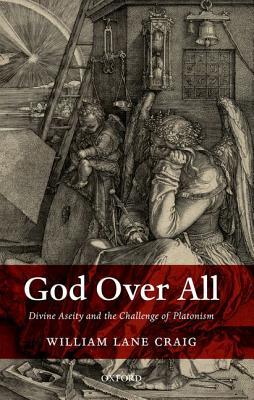God Over All: Divine Aseity and the Challenge of Platonism
by William Lane Craig
God Over All: Divine Aseity and the Challenge of PlatonismGod Over All: Divine Aseity and the Challenge of Platonism is a defense of God's aseity and unique status as the Creator of all things apart from Himself in the face of the challenge posed by mathematical Platonism. After providing the biblical, theological, and philosophical basis for the
traditional doctrine of divine aseity, William Lane Craig explains the challenge presented to that doctrine by the Indispensability Argument for Platonism, which postulates the existence of uncreated abstract objects. Craig provides detailed examination of a wide range of responses to that argument,
both realist and anti-realist, with a view toward assessing the most promising options for the theist. A synoptic work in analytic philosophy of religion, this groundbreaking volume engages discussions in philosophy of mathematics, philosophy of language, metaphysics, and metaontology.
traditional doctrine of divine aseity, William Lane Craig explains the challenge presented to that doctrine by the Indispensability Argument for Platonism, which postulates the existence of uncreated abstract objects. Craig provides detailed examination of a wide range of responses to that argument,
both realist and anti-realist, with a view toward assessing the most promising options for the theist. A synoptic work in analytic philosophy of religion, this groundbreaking volume engages discussions in philosophy of mathematics, philosophy of language, metaphysics, and metaontology.
Hardcover, 280 pages
Published December 30th 2016 by Oxford University Press, USA
© 2025 Bibleportal.com 版权所有.

William Lane Craig is an is an American Evangelical Christian apologist, theologian, and philosopher known for his contributions to the philosophy of religion, historical Jesus studies, and the philosophy of time. He is one of the most visible contemporary proponents of natural theology, often participating in debates on the existence of God. In 1979, Craig authored The Kalam Cosmological Argument, which is today the most published-on contemporary argument for theism in philosophy.
He is currently a Research Professor of Philosophy at Talbot School of Theology, Biola University. He is a fellow of the Discovery Institute's Center for Science and Culture, which is the hub of the intelligent design movement,[3] and a fellow of the International Society for Complexity, Information and Design (ISCID).[4] He is also a member of the American Philosophical Association, the American Academy of Religion, and a member and past president of both the Philosophy of Time Society and the Evangelical Philosophical Society.
... Show more